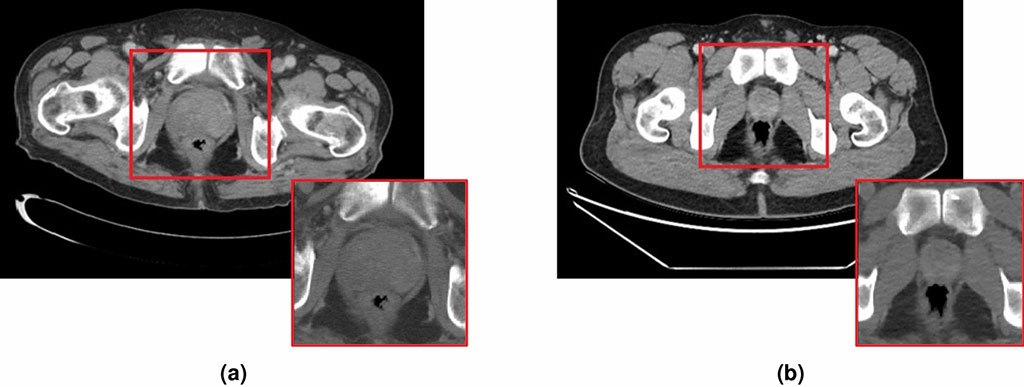AI System Detects Prostate Cancer During Routine CT Scans
By MedImaging International staff writers
Posted on 15 Nov 2021
A new study describes an artificial intelligence (AI) based framework that can rapidly spot incidental prostate tumors during abdominal or pelvic scans.Posted on 15 Nov 2021
Developed at RMIT University (RMIT; Melbourne, Australia) and St. Vincent's Hospital (SVHM; Melbourne, Australia), the new convolutional neural network (CNN) is designed for incidental computer aided detection (CADe) of clinically significant prostate cancer in patients undergoing a computerized tomography (CT) scan of the abdomen or pelvis for other reasons. The dataset used to develop the CNN consisted of 139 clinically significant prostate cancer patients and 432 controls.

Image: CT slices of a patient with prostate cancer (a), and one without (b) (Photo courtesy of SVHM/ RMIT)
The results showed that the proposed CNN pipeline achieved an area under the receiver operating characteristic curve (ROC-AUC) of 0.88 on CT, significantly higher than that of two radiologists (0.61 and 0.70) set on the same task. In addition, the results confirmed that the screening capabilities of CT-based pipelines, when combined with deep learning CNNs, are comparable to those of magnetic resonance imaging (MRI)-based diagnostic pipelines. The study was published in the November 2021 issue of Scientific Reports.
“Australia doesn’t have a screening program for prostate cancer, but armed with this technology, we hope to catch [such] cases early in patients who are scanned for other reasons,” said study co-author radiologist Mark Page, MD, of SVHM. “For example, emergency patients who have CT scans could be simultaneously screened for prostate cancer. If we can detect it earlier and refer them to specialist care faster, this could make a significant difference to their prognosis.”
In Australia, prostate cancer is responsible for approximately 12% of all male cancer deaths, as the slowly-growing tumors often go unnoticed for years. It is typically difficult to spot prostate cancer in CT images, and the radiation doses required make CT unsuitable as a screening modality. However, if men need to undergo an abdominal or pelvic scan for other reasons, CADe could help spot prostate cancer and let clinicians initiate early treatment.
Related Links:
RMIT University
St. Vincent's Hospital













